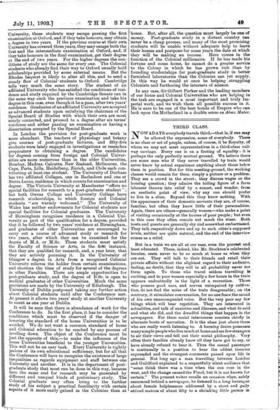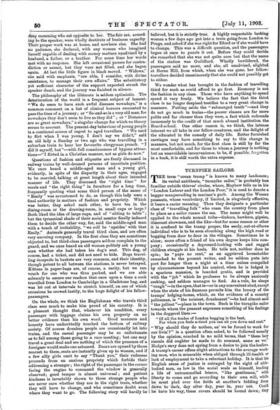THIRD CLASS.
ATOW &DAYS everybody travels third,—that is, if one may be allowed the expression, some of everybody. There is no class or set of people, unless, of course, it be Royalty, of whom we may not meet representatives in a third-class rail- way carriage. Every one is on a footing of equality it is perhaps the only perfectly neutral ground. We believe there are some men who if they never travelled by train would never know by actual experience anything about those below them in position. But for this meeting-ground, the working classes would remain for them simply a picture or a problem. They see a crowd in the street; they discuss wages on the housing question; they admire the toiling figure of a farm labourer thrown into relief by a sunset, and wonder, from an aesthetic point of view, why any one should prefer to live in a slum. Beyond this they know nothing. With the appearance of their domestic servants they are, of course, familiar, but often they know little of their personalities. Again, there are others—generally women—who make a point of visiting occasionally 'at the houses of poor people; but even in this case they often remain net much the wiser. Both hosts and guests are generally shy and somewhat embarrasied. They talk,respectively down'and up to each other's supposed levels, neither are quite natural, and the end of the interview comes as a relief.
But in a train we are all at our ease, even the poorest - an& least educated. These, indeed; like Mr. Stockton's celebrated heroine, seem never to be so much at home as when uiey are out. They will talk to their friends and retail their private affairs without the slightest regard to their audience, feeling, no doubt, that they will in all probability never see them again. To those who travel seldom travelling is exciting, and to poor women especially a few hours in the train appears undoubtedly in the light of a recreation. Those who possess good ears, and nerves unimpaired by cultiva- tion, do not find the noise of the train disagreeable ; on tlle contrary, it stimulates conversation, for no one fears the sound of his own unaccompanied voice. But the very poor say few things which will bear repetition. They are interested in actualities, and talk of anxieties and illnesses, and what ke said and what she did, and the dreadful things that happen in the' newspapers. For them social intercourse consists chiefly in alternate bouts of narration. It is the class just, above them who are really worth listening to. A burning desire possesses many simple people who live much at home and see few strangers to air their views and tell out their social philosophy.. Very often their families already know all they have got to say, or have already refused to hear it. Thus the casual passenger is continually in a position to hear the oddest, theories expounded and the strangest comments passed upon life in general. Not long ago a man travelling between London and Guildford explained to a respectfully silent audience that "some think there was a time when the sun rose in the west, and the change caused the Flood, but it is not known for , certain." The present writer recalls an occasion when, eafely ensconced behind a newspaper, be listened to a long harangue about female helplessness addressed by a stout and gaily attired matron of about fifty to a shrinking little person in
deep mourning wlio sat opposite to her. The fair sex, accord- ing to the speaker, were wholly destitute of business capacity.
Their proper work was at home, and nowhere else. She had no patience, she declared, with any woman who imagined herself capable of dealing with money matters unadvised by a husband, a father, or a brother. For some time her words met with no response. She left occasional pauses for contra- diction or assent, but they were not filled, and she began again. At last the little figure in black moved. " Widows," she said with emphasis, "are able, I consider, with divine assistance, to manage their own affairs." The substitntory yet sufficient character of the support expected struck the speaker dumb, and the journey was finished in silence.
The philosophy of the illiterate is seldom optimistic. The deterioration of the world is a frequent subject of lament- " We do seem to have such awful diseases nowadays," is a common comment on a list of clinical horrors recounted to pass the time of a journey ; or " So-and-so is a very old man, for nowadays they don't seem to live as they did " ; or " Distances are so great nowadays," a singular change for which no theory seems to account. The present-day behaviour of young people is a continual source of regret to aged travellers. •' We used to flirt when I was young, I don't say we didn't," said an old lady a Sunday or two ago who was travelling in a suburban train to hear her favourite clergyman preach. " I did it myself, but "—with full consciousness of bygone attrac- tions—" I flirted in a Christian manner, not as girls do now."
Questions of fashion and etiquette are freely discussed in railway trains by well-dressed persons of uncertain position. We once heard a middle-aged man and a young girl, evidently, in spite of the disparity in their ages, engaged to be married, talking at great length about their intended manner of life. They discussed the " right time " for meals and "the right thing" in furniture for a long time, frequently quoting what some third person of the name of " Emily " was accustomed to do, as though this lady were a final authority in matters of fashion and propriety. Which was better, they asked each other, to have tea in the dining-room or the drawing-room, in small cups or large ? Both liked the idea of large cups, and of " sitting to table" ; but the tyrannical shade of their social mentor finally induced them to decide the other way, for, said the middle-aged man with a touch of irritability, "we will be ' upsides' with that Emily." Animals generally travel third class, and are often very amusing company. In the first class they are sometimes objected to, but third-class passengers seldom complain to the guard, and we once heard an old woman politely ask a young man whether she had taken his dog's seat. This dog, of course, had a ticket, and did not need to hide. Dogs travel- ling incognito in baskets are very common, and their identity, though patent to all between the stations, is never betrayed. Kittens in paper-bags are, of course, a rarity, but we can vouch for one who was thus packed, and we are able solemnly to assure our readers that once upon a time a cock travelled from London to Cambridge in a Gladstone bag, and was let out at intervals to stretch himself, on one of which occasions he crowed lustily, to the huge delight of his fellow- passengers.
On the whole, we think the Englishman who travels third class sees much to make him proud of his country. It is a pleasant thought that, whatever his condition, every passenger with luggage claims his own property on no better evidence than his own word. Good manners and honesty have undoubtedly touched the bottom of railway society. Of course drunken people are occasionally let into trains, and the casual passenger may be so unfortunate as to fall among those going to a race meeting; but one may travel a great deal and see nothing of which the presence of a foreigner would make one ashamed. Doors are opened by those nearest to them, seats are instantly given up to women, and if a few silly girls omit to say "Thank you," their rudeness proceeds from an anxious propriety which forbids their addressing a stranger ; the right of the passenger in the corner facing the engine to command the window is generally observed; good temper is almost universal ; and patient kindness is invariably shown to those strange people who are never sure whether they are in the right train, whether they will have to change, and who sometimes doubt even where they want to go. The following story will hardly be believed, but it is strictly true. A highly respectable looking woman a few days ago got into a train going from London to Penge, and asked if she was right for Ilford or if she would have to change. This was a difficult question, and the passengers began at once to puzzle it out. Before they could decide she remarked that she was not quite sure but that the name of the station was Guildford. Wholly bewildered, the passengers said no more, and she, all unadvised, alighted at Herne Hill, from which, when she was gone, her fellow- travellers decided unanimously that she could not possibly get to either.
We wonder what has brought in the fashion of travelling third for such as could afford to go first. Economy is not the fashion in any class. Those who have anything to spend spend it very freely. We believe the fact that the third class is no longer despised testifies to a very great change in manners. Putting aside the " submerged tenth "—and they do not go much in trains—the poorer classes are far more polite and far cleaner than they were, a fact which redounds immensely to the credit of that much abused institution the Board-school. One other reason is, we think, the intense interest we all take in our fellow-creatures, and the delight of the educated in the comedy of daily life. Better furnished carriages may have something to say to this change in manners, but not much, for the first class is still by far the most comfortable, and for those to whom a journey is nothing but an unavoidable inconvenience, to be, if possible, forgotten in a book, it is still worth the extra expense.







































 Previous page
Previous page